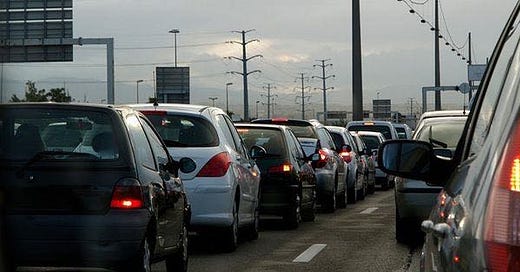Routine kills a man
I’m confident that humans aren't wired for routine. Routine irks us. My opinion is based on observations of previous coworkers, many people I know and personal experience. And I'm willing to bet that you struggle with routine too.
I don't mean good routines like brushing your teeth or meeting your friends for a coffee or a morning run. I'm referring to the unchanging routine of our general existence. Once something becomes routine our consciousness shuts down then our subconscious takes the reins as we move into autopilot and boredom begins.
Ask yourself this: why do you become bored? The idea that you (or "the self") decide what's boring is nonsensical when you think about it. I like the logical theories evolution generates and although we can never be 100% certain as to why we feel a certain way, the best one I uncovered as to why we feel boredom is the following:
"Like hunger, thirst and loneliness, boredom is a negative feeling that drives us to change our behaviour. Natural selection has favoured individuals with the capacity to feel bored because they are more likely to discover or create things that improve their survival chances, or to look for a new partner and so spread their genes more widely. Contentment leads to complacency, and that’s a dangerous evolutionary strategy. "
Just as our bodies have not evolved to eat a diet full of high-fructose corn syrup, our minds have not evolved to be subjected to unchanging routine which is what the modern world requires of us.
Offices are the factories of the 21st Century
Manufacturing used to make up 40% of the UK economy following World War II, it's now 8%. There's been a huge shift to the service industry which has happened across most of the developed world. In addition, the majority of work on factory assembly lines has been replaced by machines. Perhaps this is why society created so many office jobs: office work is so meaningless and abstract it's too hard for machines (regardless of how intelligent they become) to ever understand!
On the surface, working in an office seems to be an improvement compared to working in a factory and while that might be true from a physical standpoint, the pointless and routine nature of office work makes it a psychological slog; the same (terrible) everyday commute on packed public transport or stuck in traffic on congested roads, sitting at the same desk, writing email all-day, going to meeting after meeting (about nothing in particular) ... rinse and repeat every day ... forever.
The jobs created by society are truly terrible. I'm sure most people (like me) enjoy work when it gives them a sense of purpose, however, the terrible brain-numbing jobs that we are expected to do are mental torture.
What do you do?
It always makes me smile when someone asks "What do you do?". This question used to make sense when we had distinguishable jobs such as being a butcher, baker or candle stick maker. Now it doesn't matter what field you work in because the chances are your job is email and meetings. Even if you have a "real job" there's a good chance your day is filled with email and meeting drudgery.
I was speaking to a Swedish paediatrician recently while travelling in Portugal. As most conversations go, after a little small talk it got around to the usual "What do you do?". I explained that I used to have a meaningless job in marketing but couldn't tolerate the pointless nature anymore. When he told me that he was a paediatrician, my immediate response was "Oh, you have a real job". His response surprised me though. He went on to say that he sits at a desk all day working on a computer and rarely meets patients. He said that being a paediatrician wasn't what he expected.
It seems that regardless of what your occupation is, you are confined to the factories of the 21st century: sitting at a desk and staring at a screen. If a factory worker from the Victorian era could see us today they would say how fortunate we are, and from a safety perspective, they would be right. (I've never heard of anyone being injured while working on a PowerPoint presentation.) But I doubt whether being stuck in an office is any less tedious than being stuck in a cotton mill.
Anything becomes routine
It's not just routine work that makes us feel bored and numb inside -- it's everything else too.
On the whole many of us are bad predicators of what will make us happy. This attempt of predicting how we'll feel in the future has a name, it's called "affective forecasting". Our minds are used as time travel devices that go into the future and imagine what it will be like if we do this thing or that thing or live somewhere new. However, unlike Doctor Who or Marty McFly, we can't experience things for ourselves firsthand. Instead, our minds make a best guess based on very limited (and often biased) information.
A common trap we seem to fall for is to believe that permanent happiness will ensue when we stop working, or when we move to an exotic location, or when we buy a new [whatever]. However, when we achieve our said goal, the improvement in our mood eventually dissipates. I put this down to our prehistoric DNA (we need variety) and therefore our happiness is temporary. How long the effect of happiness lasts may depend on how big a change has been made but eventually our mood improvement disappears and we're back to where we began.
Portugal ☀️
I'm currently in Portugal staying at a friend's house having been here for nearly three months. At the beginning of my trip when everything was new and exciting my levels of joy were extremely high, but nearly three months later those levels of joy have reduced significantly. Everything is now normal and I'm now looking forward to a change in scenery and returning to the UK.
On the whole, I believe that many people who relocate overseas to escape the drudgery of their home country are swapping one routine for another. There are hard to disputable benefits of living somewhere like Portugal such as sunny weather, and lower cost of living, however, my friend who's living here doesn't seem any happier -- he still complains as much as when he lived in the UK.
Moving to Portugal, the South of France or [insert your favourite destination] will (after enough time) probably not live up to expectations. And before you know it, you'll be complaining about the food that you can't get (from back home), the slow internet speed and poor customer service.
In my opinion, the key to increased well-being is not to permanently escape a particular routine or place, it's to increase variety so that no one thing feels like it's never-ending. Whenever we leave our home or escape a routine and return to it later it feels somewhat enjoyable again (for an amount of time) before feeling routine again.
Variety makes life interesting. Variety is the spice of life.



